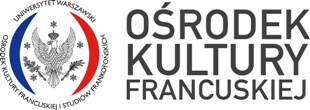Le mardi géopolitique du 9/03/2021

Le Centre de civilisation française et d’études francophones, la Faculté de sciences politiques et d’études internationales de l’Université de Varsovie, l’Association polonaise d’études internationales et le Groupe d’études géopolitiques vous invitent à la rencontre dans le cadre du séminaire MARDIS GÉOPOLITIQUES.
From enemy to ally. The accession of Hungary, Poland and the Czech Republic to NATO
dr Amélie Zima (CCFEF)
prof. Andrzej Szeptycki (Faculté de sciences politiques et d’études internationales de l’Université de Varsovie)
le mardi 9/03/2021
15h00 – 16h30
Le séminaire aura lieu en ligne : https://meet.google.com/zvh-mesv-xfj
La rencontre se tiendra en anglais.
We would like to introduce you a book of dr Amélie Zima (CCFEF) entitled „From enemy to ally. The accession of Hungary, Poland and the Czech Republic to NATO”, Bruxelles, Peter Lang, 2019.
Less than ten years after the dissolution of the Warsaw Pact, three post-communist countries, Hungary, Poland and the Czech Republic, become members of NATO. How to explain this shift from the status of enemy to that of an ally? To do so, Amélie Zima’s book analyses the institutional renovation of the Atlantic Alliance, using the concept of “institutional tinkering” to explain how NATO reinvented an accession process in the nineties. The analysis also deconstructs labels showing that the Atlanticism of Central European countries was a political construction which resulted from national political games and painful pasts, and also shows that NATO was not really a socializing institution. Based on interviews with Hungarian, Polish and Czech key politicians and diplomats, this book sheds new light on NATO first post-Cold War enlargement and post-communist dynamics. As NATO’s enlargement policy is slowing down, the liberal dimension of the Alliance is questioned by the authoritarianism of some MS and, the relationship with Russia is confrontational, it is worth looking back at the fundamental decade of the 1990s which shaped the post-cold war order and laid the foundations of the new European arena.
